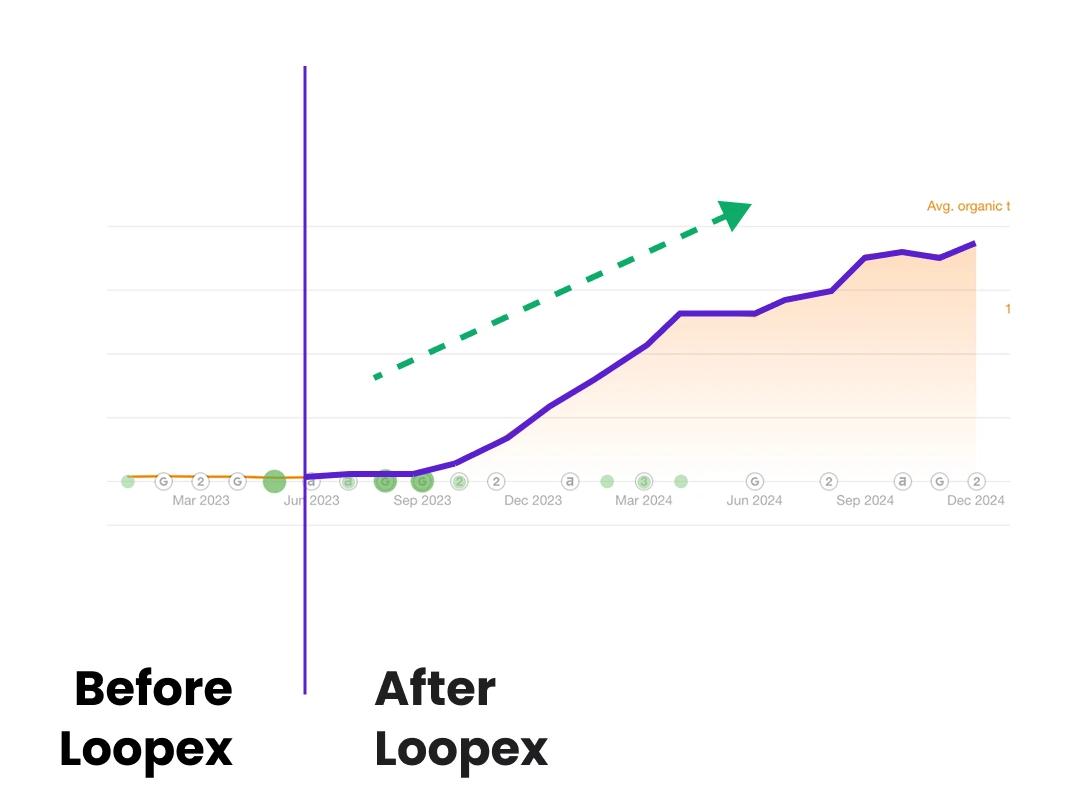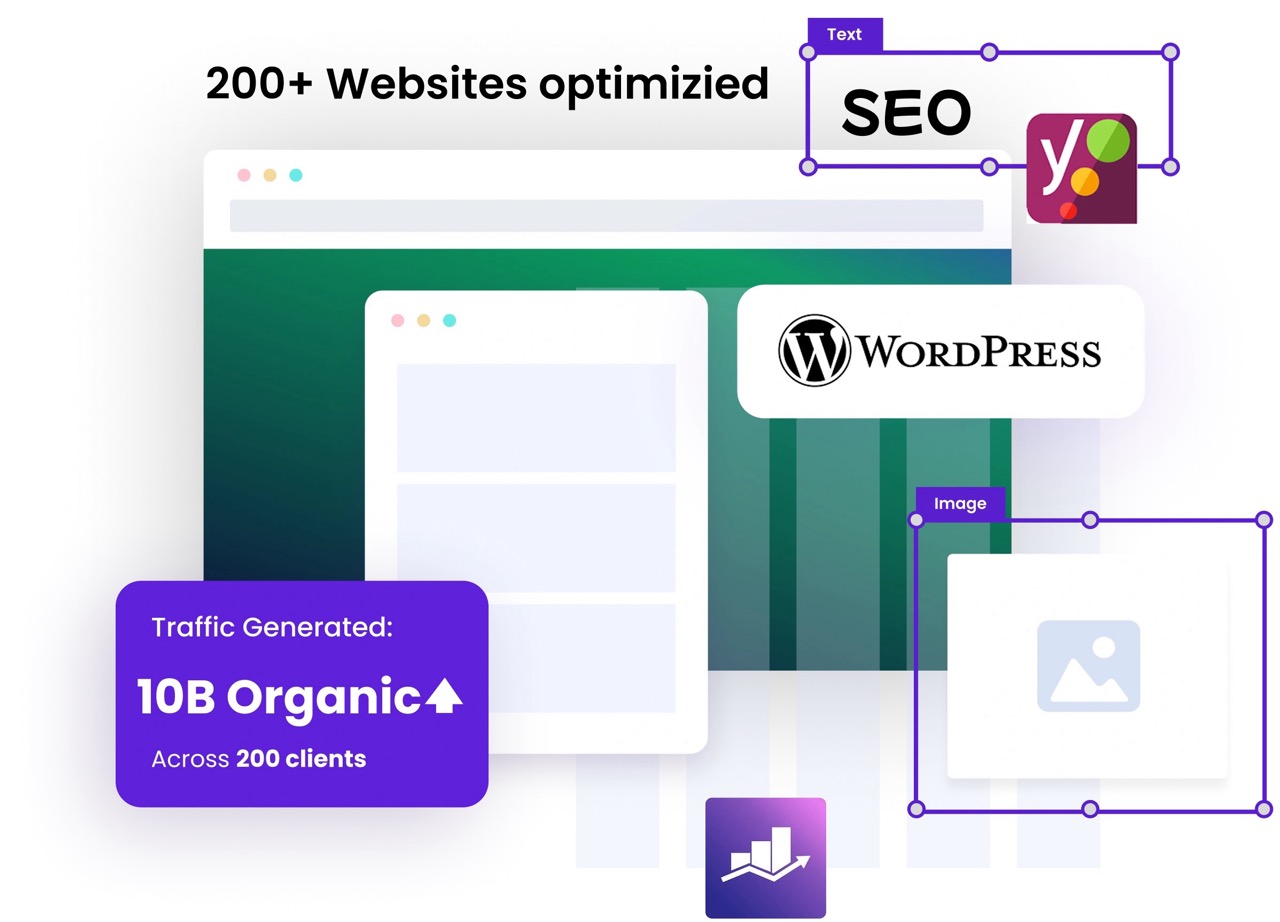%205.svg)
24 hours
.webp)







_logo%202.svg)



.svg)
Partner with our expert Wordpress SEO agency to drive better organic search results for your website.



















Issue #1:
Plugin Overload and Code Bloat That Hurts Performance
Many WordPress sites rely on a patchwork of plugins to add functionality. Over time, this can lead to bloated code, redundant scripts, and conflicts that slow down your site. Even a well-optimized page can lose rankings if the underlying codebase is cluttered and inefficient.
Some plugins inject inline styles or duplicate schema, which can confuse search engines and hinder page rendering.
We audit your active plugins and theme files to identify what’s slowing down your site. Then, we collaborate with your developers to remove or replace problem plugins, clean up unused code, and optimize your site’s performance without sacrificing functionality.
Issue #2:
URL Hierarchy Issues
A clear, organized URL structure helps search engines understand the relationship between your WordPress pages and index them correctly. When the URL hierarchy is messy or inconsistent, it can confuse both users and search engines, making it difficult to crawl and index your WordPress site.
We begin by reviewing your WordPress site’s URL structure and identifying any inconsistencies. Then, we organize your URLs into a logical, user-friendly hierarchy that accurately reflects the content of each page.
We also set up proper redirects and remove any duplicate URLs to ensure both search engines and visitors can navigate your WordPress site with ease. This not only improves your search rankings but also enhances the user experience.
Issue #3:
Missing or Misconfigured Schema Markup
Structured data, also known as schema markup, helps search engines better understand the content on your WordPress site. This structured information allows search engines to display your content in rich snippets and increase the CTR. When structured data is missing or incorrectly implemented, it can prevent these rich snippets from appearing in search results.
We conduct a full audit of your website’s structured data to identify any gaps or errors. Then, we implement and correctly configure schema markup that aligns with your content. We also use tools like Google Search Console or Schema Validator to validate the structured data and troubleshoot any issues.















Meet the Wordpress SEO experts with 1mln hours expertise



.svg)

.webp)






Read our case studies
.svg)

Deep experience with Wordpress architecture, themes, and plugin ecosystems
Builds custom WordPress SEO strategies based on your site structure, content model, and business goals
150-point Wordpress technical SEO audit covering page speed, core web vitals, crawl errors, schema markup
Fixes URL conflicts across posts, categories, tags, and pagination to streamline indexability
Implements custom structured data for blog posts, services, and dynamic content types to earn rich results
Optimizes speed by eliminating unused plugins, compressing assets, and fine-tuning scripts and styles
Reviews and streamlines all active plugins, replacing bloated tools with SEO-friendly alternatives
Earns backlinks from high-quality publications, partner sites, and niche-relevant blogs
Delivers live reports integrating GA4, GSC, and SEO tools, with regular calls tied to traffic, rankings, and conversions
Works across many CMS platforms but often reuses standard strategies
Often uses generalized SEO frameworks with minimal platform adaptation
Requires third-party tools or partners for deeper technical auditing
May recognize indexing problems but not resolve them at scale
Uses popular plugins l for standard schema implementation and struggles with creating advanced custom schemas
Performs basic speed tuning but often overlooks plugin-related delays
Rarely audits plugin performance in-depth or addresses conflicts
Handles link building, but usually with generic outreach campaigns
Offers reports on traffic and keyword positions, but may lack clarity on business impact
Knows the brand and audience well but may lack WordPress-specific SEO expertise
Can shape strategy around goals, though often limited by internal bandwidth
May spot obvious issues, but often lacks capacity for full-scale audits
Can manage URL basics but may struggle with complex taxonomy handling
Can add schema manually, but may not maintain it consistently
Limited time or technical know-how to fix deeper speed and performance issues
Plugins often added ad-hoc without long-term performance review
May have no link-building strategy or rely on inconsistent tactics
Tracks core metrics but may not link them directly to SEO or revenue performance
%201.svg)


.svg)

.svg)

.svg)

.svg)
.svg)
.webp)
.webp)
.webp)
Yoast is helpful for editing titles and meta descriptions, but it doesn’t optimize your site speed, fix broken sitemaps, or clean up your category structure. We audit everything Yoast can’t see, including crawlability, code-level issues, and underperforming content, and collaborate with your devs to get it fixed the right way.
Yes, slow sites rank worse and convert less. We identify what’s slowing your site down (like uncompressed images, plugin overload, or JavaScript issues) and work with your developers to address it without breaking your design. We also help tune caching, CDN settings, and Core Web Vitals to hit Google’s performance benchmarks.
Most likely, your content isn’t aligned with search intent, isn’t targeting the right queries, or lacks internal linking and topical depth. We audit what you’ve already published, identify what’s missing, and either optimize or replace it, with a focus on ranking, not just publishing.
Common ones include indexation issues, unoptimized images, broken links and redirect chains, duplicate tag/category pages, inconsistent canonical tags, and crawl issues from page builders. These aren’t always visible in dashboards. We run a technical audit, flag what needs attention, and collaborate with your developers to clean it up without disrupting your site.
Yes. If you have a blog-heavy site or a large library of pages, we build a content architecture that Google understands, using internal links and URL structures to surface your most valuable content. We also work with your team to create topic clusters that build authority over time.
They’re critical. Even with solid content and site structure, you won’t rank competitively without authority. We acquire high-quality backlinks from authoritative websites and highly relevant blogs to improve the domain rating of your website and increase keyword rankings.
You’ll likely see early improvements in 2-3 months, especially on technical fixes and quick content wins. Stronger ranking gains usually take 3–6 months, depending on your competition and site history. SEO takes time, but we make sure you see meaningful traction early.